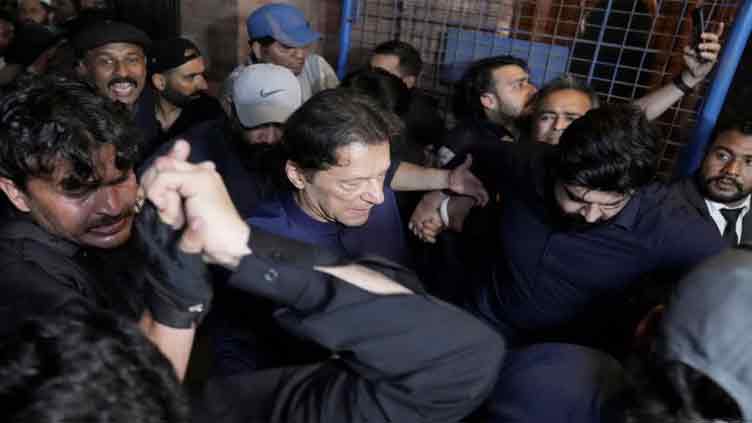PTI chief arrested minutes after being sentenced in Toshakhana case, shifted to Attock Jail

Pakistan
Move comes as the defence counsel avoids hearing despite given an opportunity
ISLAMABAD (Web Desk) – A local court sentenced the PTI chairman for a three-year term and a Rs100,000 fine in the Toshakhana case on Saturday – a move that will change the country’s political landscape as the country awaits general elections.
Announcing the short judgement, the court also disqualified him for five years from holding any office and said the detailed verdict would be shared later.
Later, the PTI chief was shifted to Attock Jail.
The court also declared that the PTI chairman was involved in corrupt practices under Section 174 of Election Act 2017 and had submitted a bogus affidavit with the Election Commission, ordering the Islamabad police chief to arrest the convict immediately while issuing the arrest warrants.
Meanwhile, the convict would face another six-month jail term in case of a failure to pay the fine, says the short order issued by the court in Islamabad.
And just over 30 minutes later, senior PTI leader Shah Mehmood Qureshi confirmed that the police had arrested his party chairman from the Zaman Park residence in Lahore.
Earlier proceedings
Earlier in the day, the court had reserved its judgement in the Toshakhana case, saying it would be announced at 12:30 (noon) as the defence counsel again failed to appear in person after the hearing was resumed at 12pm.
Humayun Dilawar – the additional sessions judge – had passed the order as the PTI chairman again failed to appear in person as he told the lawyer appearing on behalf of the main defence counsel that Khawaja Haris had been directed to attend the hearing by 8:30am which he failed to do so.
During the hearing which started after a delay, senior lawyer Amjad Pervaiz and Saad Hassan appeared before the judge to represent the Election Commission of Pakistan (ECP).
The judge asked Amjad Pervaiz whether he wanted to say something. However, Khalid Chaudhry – an associate lawyer representing Haris – requested the court to give some time as the senior counsel was busy in a NAB court’s proceedings.
However, the ECP counsel interrupted to argue that giving time wasn’t an issue; however, the accused had also been directed to ensure his presence during the hearing.
At this point, the judge asked Chaudhry whether he had the power of attorney to represent the accused in this case, to which he informed the judge that he didn’t and he was a junior lawyer of Barrister Gohar.
When asked about the nature of the NAB case, Chaudhry replied that it pertained to the bail of PTI the chairman and his wife,
When asked about the nature of the NAB case, Chaudhry replied that it pertained to the bail of PTI the chairman and his wife.
On this, the ECP counsel again intervened and said Chaudhry didn’t inform when the senior counsel would appear before the session court and that the bail plea was scheduled to heard at 2:30pm.
However, Chaudhry was of the view that the senior lawyer would reach the court for the Toshakhana case hearing as soon as getting free.
Meanwhile, the judge observed that non-bailable warrants were issued if an accused failed to appear in person and that Haris too didn’t follow the directions to reach the court at 8:30.
Adjourning the hearing till 12pm, Mr Dilawar said he would announce his judgment in the Toshakhana case if the defence counsel failed to appear before the court by then.
Earlier on Friday, the Supreme Court had dismissed the PTI chairman’s plea against trial proceedings pertaining to the Toshakhana criminal complaint after he withdrew the petition.
Similarly, the Islamabad High Court (IHC) again authorised the trial court to decide about the maintainability of the Toshakhana case and rejected a petition, seeking transfer of the matter to another court, as it ruled that Additional Sessions Judge Dilawar would continue hearing the case.
This is the third time that the IHC has empowered the trial court to decide on the admissibility as the latter had twice declared it maintainable.
It’s a developing story. Details to follow.

